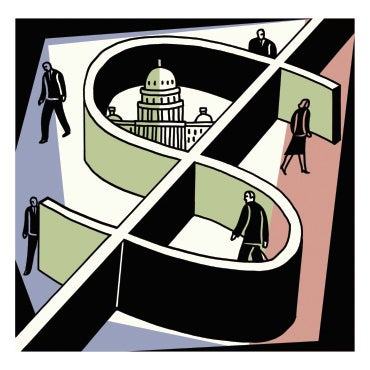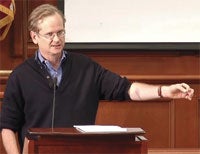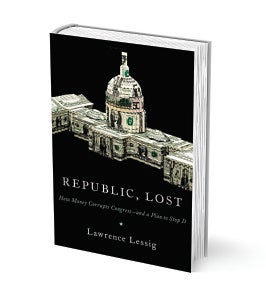
At a time when Americans are expressing record dissatisfaction with Washington, the publication this fall of Professor Lawrence Lessig’s latest book couldn’t be more opportune. “Republic, Lost: How Money Corrupts Congress—and a Plan to Stop It” (Twelve) is an exhaustively researched and passionately argued indictment of Capitol Hill and the money-centered daily dance between lawmakers and lobbyists.
Lessig, the Roy L. Furman Professor of Law and Leadership at HLS and director of Harvard’s Edmond J. Safra Center for Ethics, says that his disgust with Washington’s modus operandi grew over the course of about 10 years—from the mid-1990s to the mid-2000s—when he was a frequent visitor to the halls of Congress, advocating for reduced restrictions on copyright in the Internet age. His observation, that moneyed special interests enjoy special treatment from Congress, would hardly seem earthshaking to the average American. But as Lessig points out, the symbiosis between lobbyist and lawmaker is a far cry from a bag of greenbacks buying a favor. The current Congress may be the cleanest in history, he says. It’s just that now the influence of money on government is out in the open, operating in a legal system governed by rules that he contends are dysfunctional.
Lessig recently sat down with the Bulletin to talk about the book.
Is Congress corrupt?
I don’t think there’s a significant amount of bribery, or that kind of corruption. It’s institutional corruption—and by institutional corruption I mean corruption that doesn’t involve any illegal activity at all. This is legal corruption. It’s members completely, legitimately and openly spending 30 to 70 percent of their time focusing on the task of raising money, developing the sixth sense about how what they do might affect their ability to raise money, constantly shape-shifting so that when they walk into that room, the guy with the money will have reason to give money to that congressman. It’s that process that is a corruption, in my view, and that is responsible for the inability of this government to govern.
To what extent do you think the average congressman has qualms about this system?

I think certainly the average congressman hates the system. They think, I didn’t come to Washington to spend half my time making anonymous phone calls to people asking for money. “Dialing for dollars” is not why I came to Washington. On the other hand, they got to Washington and they think to themselves, I won under this system and I’m not eager for another system because I might not be able to win. And there are some who think, OK, I spend six or eight years in this system and then I’ll graduate and become a lobbyist and I’ll make real money leveraging all the connections I made inside the Hill, so I like this system.
Have you seen any change in Congress over the years in terms of members’ susceptibility to lobbyists?
There has been a radical change in just the last 20 years. The Gingrich Congress (after the 1994 midterm elections) really changed the process. … That process encouraged a massive devotion of energy toward the idea of raising money, and that, thereby, leveraged power of those who were giving the money to control or deflect change inside the system. … Maybe the biggest testimony to how bad it’s gotten is that you have a president like Obama who comes in dedicating himself to changing the system but very quickly gives up and doesn’t even pursue it.
Can he still do it?
I wish he could, but I think, increasingly, that he might just not be the person who’s got the constitution to wage that kind of battle. That battle’s going to require someone who’s strong enough to be hated.
Say more about how your suggestions for fixing the problem might get off the ground.

I’m increasingly of the view that the cancer in D.C. is too progressed for D.C. to cure itself. The framers of our Constitution envisioned a case in which Washington itself becomes the problem, and they gave us a way around Washington: That’s the convention process. So I think what has to happen is that we have to build a political movement to drive toward a constitutional convention, and then in the context of the convention we have an opportunity to have people deliberate seriously about what kind of change the government needs.
What are the groups in place that could do this?Fear
The Tea Party is the inspiration for this possibility. I’m not a member of the Tea Party, and I disagree fundamentally with some of the values that they hold. But I’m a great admirer of their ability to mobilize people enough to create great terror inside the existing political system.
What do you think the reaction to your book will be?
Obviously, there are going to be people who aren’t going to like it—people inside the Beltway and a lot of my friends—because the book is very critical of Obama. But I’m not sure. It’s the first time I’ve written something that I’m deeply anxious about.